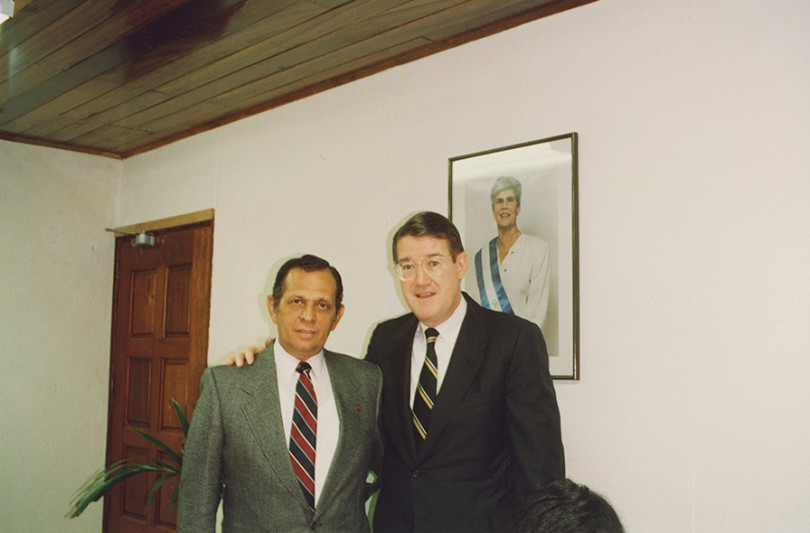
Carlos Garcia, longtime international baseball leader and President, Nicaraguan Baseball Federation (left), with Dodger President Peter O’Malley and a portrait of Nicaraguan President Violeta Barrios de Chamorro behind them. O'Malley was a guest of the Nicaraguan Sports Institute, met with President Chamorro during his October 30-November 2, 1990 visit to Managua.
Biography
Carlos Garcia
Carlos Garcia from Managua, Nicaragua was a driving force behind the growth of international baseball and was involved in advancing its cause for decades. Garcia was President of Nicaraguan Baseball, had founded the Nicaraguan Amateur League in 1970, and worked with Dr. Bob Smith, Peter O’Malley, Rod Dedeaux, Bowie Kuhn and others to advocate baseball in the Olympic Games as a medal sport. Garcia traveled around the world asking for the commitment of IOC members to officially include baseball. In 1975, he became President of Federacion Mundial de Beisbol Amateur (FEMBA), one of two international baseball organizations along with Federacion Internacional Beisbol Amateur (FIBA). In January, 1976, the two international bodies merged into the Associacion Internacional Beisbol Amateur (AINBA). Cuba’s Manuel Gonzalez Guerra was elected AINBA President from 1976-1979. Garcia was considered a front-runner to be named the next AINBA President until May, 1980. Garcia was then placed in a Nicaraguan prison and sentenced to 10 years, charged with being a leader of a Contra movement to overthrow the Communist Sandinista Nicaraguan government. Without a trial, Garcia would serve 4½ years in prison, lose his job and his property. During the 1980 World Championships and AINBA Congress in Tokyo, Garcia was still elected president, while Dr. Smith was elected vice president and became acting president at that time. When it was apparent that Garcia was not going to be released from prison soon, Dr. Smith was named AINBA President in 1981 at the AINBA Congress in Canada.
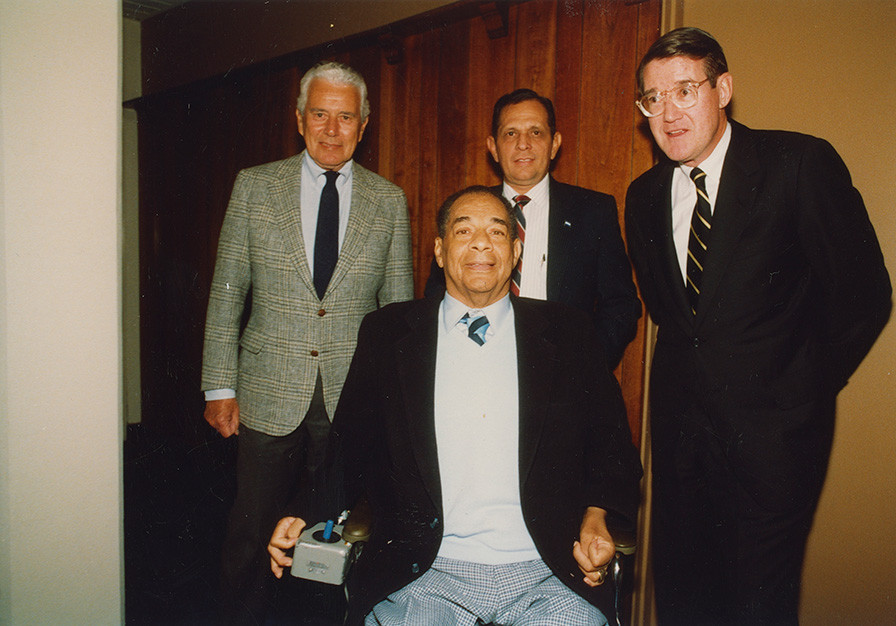
(L-R): Actor John Forsythe; Carlos Garcia, President of Nicaraguan Baseball; Dodger President Peter O’Malley. Front — Dodger Hall of Fame catcher Roy Campanella, Dodger Stadium, Los Angeles, circa mid-1980s. Garcia, an advocate of expanding baseball internationally, was selected as Minister of Sports in Nicaragua and remained in contact with O’Malley throughout his career.
On August 7, 1984, a sellout crowd watched Japan win the Olympic Baseball finals at Dodger Stadium against the USA to open the eyes of the world that international baseball competition was indeed making major strides. Some 11 weeks later, October 26, 1984, the Sandinistas under pressure from a large worldwide community suddenly released Garcia after 1,640 days of captivity. Garcia was taken to a private hospital in Nicaragua and then transferred to Miami to try to get his health and strength back. After gaining back normal weight, he began lecturing to classes and groups in the U.S. about human rights violations and his experience. Garcia was invited by U.S. President Ronald Reagan to the White House for a briefing of Central American leaders on March 25, 1985. But baseball was on his mind. “My first love, as always, is to see baseball become a permanent medal sport in the Olympics,” he said in April, 1985. “The day that sportsmen rule our various countries, instead of politicians, peace and freedom will prevail.” Garcia did get back to helping baseball. “I have my life to lead,” he said in 1985. “I’ve talked to a lot of people, including Peter O’Malley of the Dodgers, an old friend, Bob Smith and others. I’m now 52.”
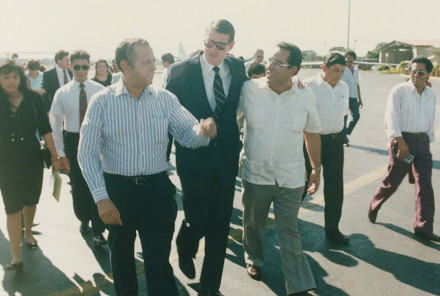
October 30, 1990, Dodger President Peter O’Malley (front center) arrives at the Managua, Nicaragua Airport and is welcomed on either side by Carlos Garcia (left), President, Nicaragua Baseball Federation and longtime international baseball leader, and Arnoldo Aleman, Mayor of Managua, on right who later became the country’s 56th president.
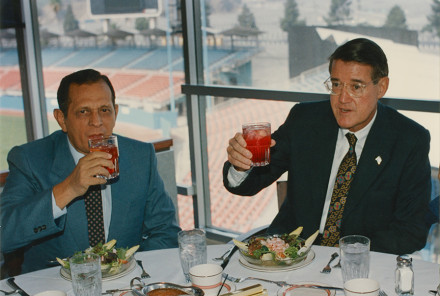
Carlos Garcia, Minister of Sports, from Nicaragua, (left) at a lunch meeting with Dodger President Peter O’Malley at The Stadium Club, Dodger Stadium, Los Angeles. Garcia and O’Malley were participating in executive meetings of the International Baseball Association at Dodger Stadium from October 17-20, 1992. O’Malley privately built Dodgers Little League Friendship Field in Managua, which opened on January 18, 1992, for the youth of Nicaragua.
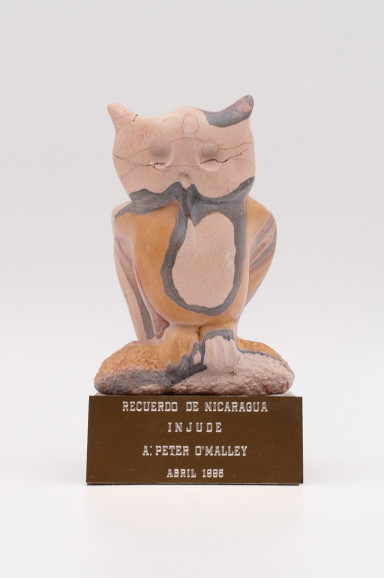
On April 28, 1995, Carlos Garcia, Minister of Sports in Nicaragua, visited Dodger Stadium and presented this owl to Dodger President Peter O’Malley in appreciation for the longtime friendship between them.
Garcia was Minister of Sports in Nicaragua and, as of 2008, secretary general of the Nicaraguan Olympic Committee. Peter O’Malley privately built “Dodgers Little League Friendship Field” in Managua, opened January 18, 1992 and Garcia was there to celebrate along with Violeta Barrios de Chamorro, President of Nicaragua. The small stadium, with seating for 3,000, was painted blue in honor of the Dodgers. Garcia presented a scroll to O’Malley stating, “Testimony of Gratitude to the Los Angeles Dodgers Organization through its president Mr. Peter O’Malley for their valuable contribution for the construction of the First Little League Baseball Stadium justly baptized as Dodgers Friendship. Managua, January 18, 1992. Carlos J. Garcia Solorzano, Minister of Sports”. On March 15, 1993, Garcia was invited to Dodgertown, Vero Beach, Florida by Peter to attend meetings, along with Dr. Smith, Kuhn, Aldo Notari (Italy) and Alonzo Perez (Mexico). Garcia, Perez and Notari were all vying for the IBA presidency later that year to succeed Dr. Smith. Notari was eventually elected president and served for the next 13 years. In his book Full Count for Baseball, Garcia writes: “O’Malley, a true gentleman and philanthropist, has sponsored great events of the International Federation of Amateur Baseball over the years, such as the Congress of Delegates of 1979 (in Los Angeles). He placed the facilities of Dodgertown at the disposal of trainers from various parts of the world to improve their Baseball skills and allowed the use of his stadium for the Baseball games of the 1984 Olympic Games in Los Angeles, not to mention the generous assistance and encouragement he has given to Baseball leaders who have been struggling in favor of international Amateur Baseball.” In 2014, Garcia passed away at age 83.

